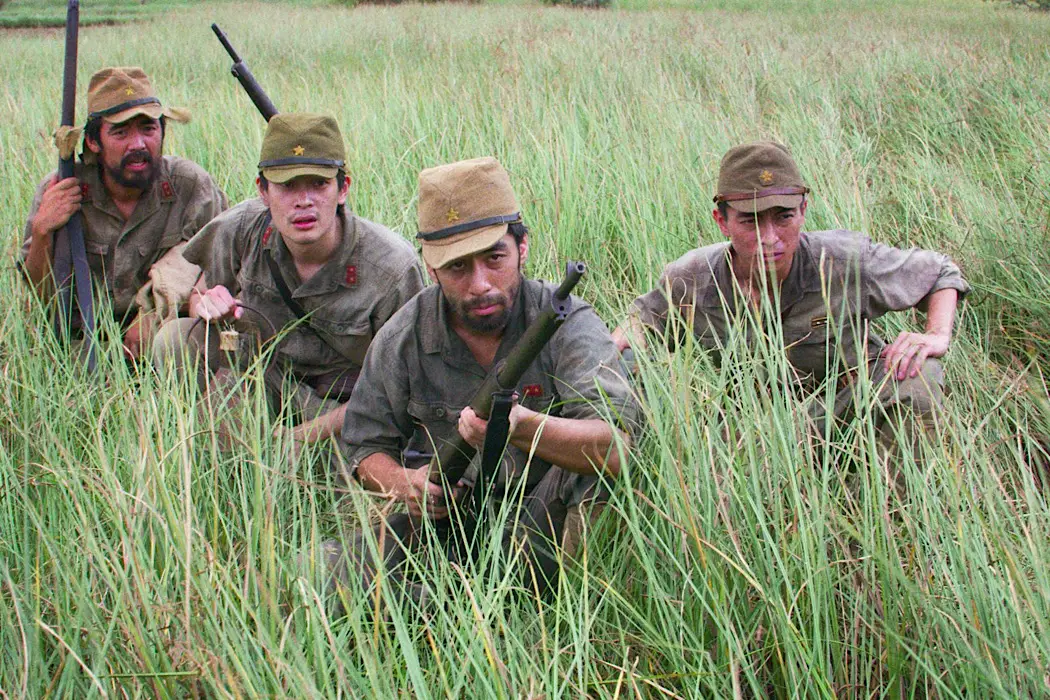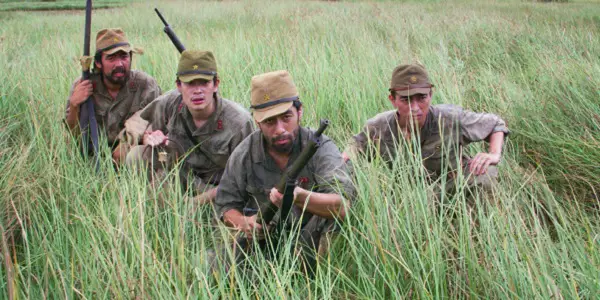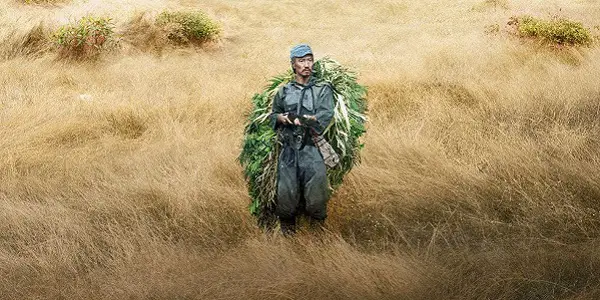ONODA: 10,000 NIGHTS IN THE JUNGLE: A Lonely Thirty Years’ War

Lee Jutton has directed short films starring a killer toaster,…
Imperial Japanese Intelligence Officer Hiroo Onoda was sent to Lubang Island in the Philippines in December 1944. His mission? To do anything and everything possible to keep enemy forces from taking control of the island. Surrender and suicide were not options; he was told to fight up until the moment his commanding officers arrived to relieve him of duty. And so Onoda, determined to hold out until Japanese troops returned, remained on Lubang Island for thirty years, waging guerrilla warfare and refusing to believe reports that the war was over and the Empire of Japan had fallen.
Those long, strange, almost unbelievable years are dramatized in Onoda: 10,000 Nights in the Jungle, a new film directed by Arthur Harari. Written by Harari and Vincent Poymiro in collaboration with Onoda’s biographer Bernard Cendron, the film is not a retelling so much as a reimagining of Onoda’s story; it draws more inspiration from Cendron’s biography than Onoda’s own memoirs, and certain events are tweaked for dramatic effect. The result is a hallucinatory look at the horror of war that revels in the absurdity as well as the tragedy of Onoda’s thirty-year refusal to face reality—something that feels disturbingly timely when one considers society’s ongoing preoccupation with “fake news.”
Life During Wartime
By the time young Onoda (Yuya Endo) completes his training at the intelligence academy under the imperious Major Taniguchi (Issey Ogata) and arrives in the Philippines, the Japanese troops stationed there are already running low on supplies and motivation. The men he’s supposed to be serving with are reluctant to follow his orders, not seeing the point in continuing to wage a war that feels increasingly hopeless. Soldiers drift away and die, leaving Onoda with only three men to help him carry out his mission: Kozuka (Yuya Matsuura), Shimada (Shinsuke Kato), and Akatsu (Kai Inowaki).

The four remaining soldiers map the entire island and plot the best ways to disrupt any potential enemy activity without getting caught and killed themselves. As the days drag onward and turn into weeks, then months, the men fight among themselves and struggle to stay alive without much in the way of supplies. Emotions run high, manifesting in violent outbursts and impassioned embraces. There are surrenders, and there are deaths. There are even rumors that the war is over, and Japan has lost.
But Onoda refuses to give up. When Onoda’s father appears on the island, shouting into a megaphone for his son to put down his arms and come home in peace, Onoda declares that this must be a lookalike brought by the enemy to trick him into surrendering and that the radio and newspapers they brought are obviously full of coded messages for him to decipher. The notion that this might be real, authentic news from home never enters his mind. Onoda just cannot entertain the idea that his all-important mission was a failure before it even began…that all of the sacrifices made and the lives lost in the war were in vain. Until Major Taniguchi reappears as promised to relieve him of duty, he won’t believe the war is over—and he won’t leave Lubang Island.
Heart of Darkness
Onoda: 10,000 Nights in the Jungle runs for nearly three hours, over the course of which we watch Onoda transform from a determined young soldier to an exhausted old man (Kanji Tsuda) who has lived more of his life on Lubang Island than in the country he continues to fight for. And while it’s impossible not to empathize with him in this struggle, one wishes the film had shown more of the consequences of his ongoing activities on the people who lived on Lubang Island during that time. Apart from a few moments in which we see him stealing or burning crops, and a disturbing interlude involving a woman who comes across his hut while hiding from a typhoon, we see little of how Onoda’s war disturbed the lives of the civilians around him. The film instead sticks close to Onoda and his perspective, which needless to say is a troubled one, albeit also absolutely fascinating.

Director of photography Tom Harari (the director’s brother) captures both the natural beauty of the land and the man-made horrors of war with the same honest, unflinching gaze. Many scenes in Onoda: 10,000 Nights in the Jungle are difficult to watch, yet many others are surprisingly amusing; some are equal parts tragic and hilarious, such as when Onoda and Kozuka put their heads together and excitedly determine that the haiku read by Onoda’s alleged father is actually a coded message telling them to wait on the south coast of the island. Cut to the year 1969, and the men are still waiting on the coast for an emissary that hasn’t come, aged and slightly insane, listening to the moon landing on their radio with giddy smiles.
The performances in Onoda: 10,000 Nights in the Jungle are excellent across the board, with the actors who play Onoda and Kozuka in youth and old age conveying the humor and the heartbreak of the story to great effect. Also wonderful is Taiga Nakano as the youthful adventurer Norio Suzuki, who—bored with bourgeois life in 1970s Japan—set out on a quest to find three things: a panda, a yeti, and Lieutenant Onoda. (He found two of the three; it was an avalanche during his search for the yeti that killed him at the age of 37.) The scenes between Suzuki and Onoda during the film’s final act, in which the jocular young man gingerly tries to get the stoic older one to open up about his ordeal over a drink, provide much-needed emotional catharsis for both Onoda and the audience. And even though one knows what happens next—literally any Internet search will tell you—one still feels a satisfying sense of relief when it does.
Conclusion
Onoda’s story, as exceptional as it may be, embodies the plight of every soldier sent to fight and die. They must convince themselves that their cause is the most important and correct thing in the world; otherwise, how could they do what is required of them on the battlefield? And if it isn’t—if that cause is doomed to failure—how can they live afterward with what they have done? How can they go back to normal life, not as the heroes they were told they would be, but as symbols of defeat? I found myself swallowed up by these questions while watching Onoda: 10,000 Nights in the Jungle, and am still haunted by the possible answers. I wonder if Onoda was, too.
Onoda: 10,000 Nights in the Jungle is now available via streaming services in the U.S.
Watch Onoda: 10,000 Nights in the Jungle
Does content like this matter to you?
Become a Member and support film journalism. Unlock access to all of Film Inquiry`s great articles. Join a community of like-minded readers who are passionate about cinema - get access to our private members Network, give back to independent filmmakers, and more.
Lee Jutton has directed short films starring a killer toaster, a killer Christmas tree, and a not-killer leopard. Her writing has appeared in publications such as Film School Rejects, Bitch: A Feminist Response to Pop Culture, Bitch Flicks, TV Fanatic, and Just Press Play. When not watching, making, or writing about films, she can usually be found on Twitter obsessing over soccer, BTS, and her cat.













